Vending machines secure added-value farmgate sales
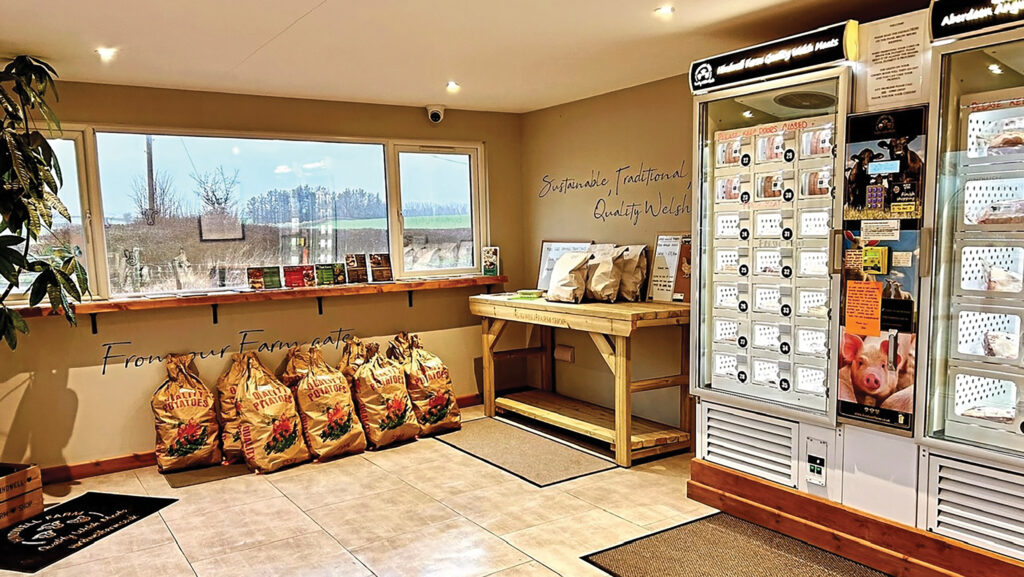 © Hindwell Farm
© Hindwell Farm There is a host of reasons why a farm might install a produce vending machine. These include adding value, and a degree of flexibility compared with manning a conventional farm shop.
Some are servicing a need for quality fresh produce where local shops have closed, others have an on-site demand, for example from campers or a farm-based attraction.
Those who have installed vending machines warn that while it may require a lower entry investment than a full-blown farm shop, it’s definitely not a case of “stock it up each morning and let the customer get on with it”.
Decisions in the run up to the first sale include whether planning permission will be needed and how many lockers to install, whether to go card only or cash and card, and whether to opt for the frozen or fresh route for meats and ready meals.
See also: Late bookings and high expectations in farm holiday market
Many operators also offer a “click and collect” service in conjunction with their vending machines.
The equipment can be anything from a basic secure locker-type box for which customers are given a code, to a more sophisticated operation including automatic stocktaking and reporting.
Stuart Retson’s family began selling eggs through vending machines at their Perth farm many years ago and continue to do so, also selling 2,500 eggs a day at the family’s Derbyshire operation at Willington.
This site also hosts a vending machine showroom for Vending by JSR, which supplies both the machines and the software for stock monitoring and other admin functions.
The business is part of JSR Services, which also produces eggs and rears pullets.
His key advice for what makes a suitable and successful site is:
- Car parking is crucial. People want to get in and out easily and safely. “If you’re on a busy road, make sure you signpost it way back before the entrance,” he says.
- Base your plans on your core products – when considering how many lockers to install, think about how many times a day you want to fill them.
- Start small – you can always add lockers, but allow for this in any building plans. Most farm sites add lockers subsequent to their first purchase.
- It can be difficult at first to gauge what will fly and what will sit in the locker for longer – but your customers will tell you.
- Housing type for the vending shop will depend on how you want to pitch your brand – some can be rustic and simply an open covered area, or you might want it to look and feel more like a shop.
- Many operators want to be able to take cash, which adds about £1,000 to the cost of the installation, but that comes with a security issue. “When there is a theft, they are never after the produce but always the cash,” says Stuart.
- Tell your story to attract custom. “Some machines are a mile up a farm road – people need to know what you do and why. Social media is great for building a customer community.”
- Basic machines do not need internet access but most vending sites do, and some rural sites struggle with connectivity. Options include a satellite service costing about £70 a month – there are cheaper providers but these are likely to limit data use. Alternatively, an initial payment of about £100 will buy a wireless 4G router, then a data only sim card can be used in the router to connect to the internet, costing about £5 a month.
Case study: Thorneybank Farm, Rothienorman, Aberdeenshire
Farm facts: Thorneybank Farm Shop
- Open every day 6am-8pm
- Cash and contactless payments
- More than 100 lockers
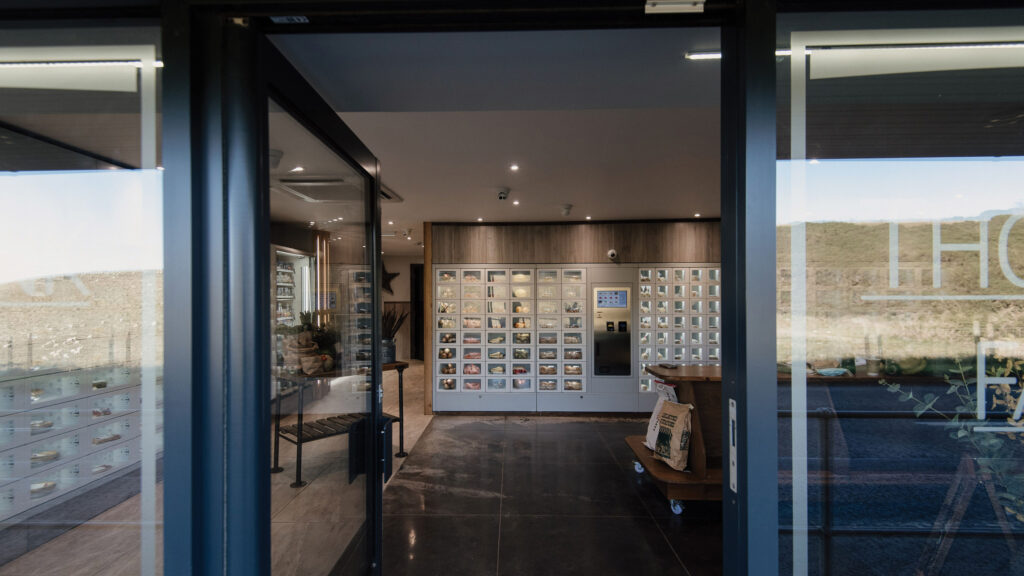
© Nicola Stewart Photography
Farm produce has been sold direct by the Stephen family since the 1970s, operating for several decades on an honesty box system at their mixed arable and livestock holding at Rothienorman, Aberdeenshire.
They installed a vending machine in 2018, after sales were falling and theft of cash and produce started to rise.
“We came to a fork in the road and had to decide whether to close or try and find something else,” says Murray Stephen, who farms with his father Stuart, mother Catherine, brother Neil and sisters Penny and Megan.
“We considered a full-blown manned farm shop and café but were put off by the investment and potential staffing issues.
“We were one of the first [to have a vending machine] so there was no one to ask about how to go about it,” says Murray.
An ambient locker system was installed in 2018, followed by a chilled unit about a year later for meat, dairy and ready meals. Baked goods are also on sale, made on site by Catherine.
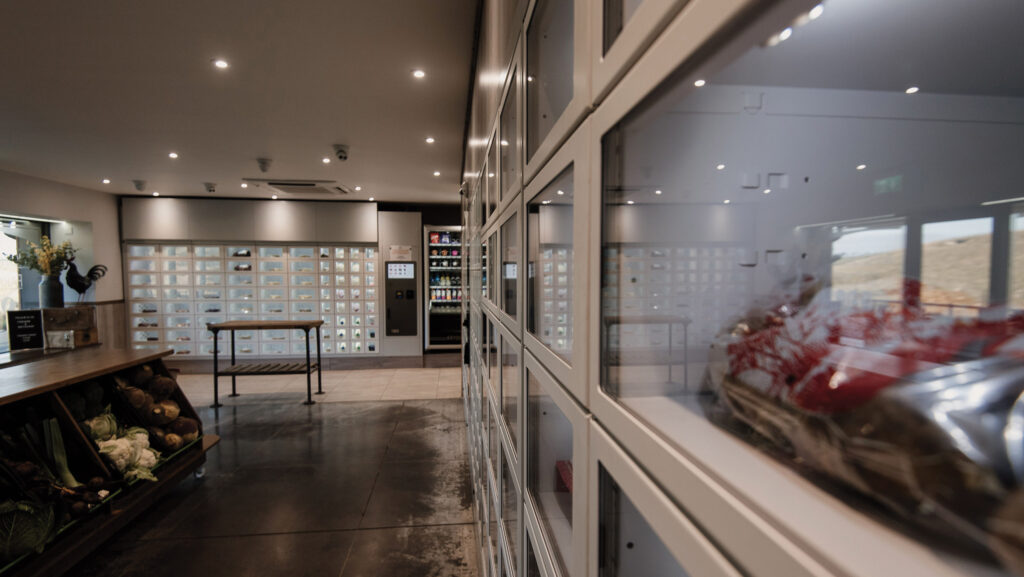
© Nicola Stewart Photography
A coffee machine and milk vending unit have since also been added, bringing the total investment to between £50,000 and £60,000.
Penny works full time on the vending operation, which she checks and stocks two to three times a day and which has automated stocktaking software and security cameras. She also runs the all-important social media operation to promote the shop.
“There is work to it,” says Murray. “It’s not just a case of stocking it once a day. We’re not at the shop all the time but there is usually someone on hand to deal with any customer queries.
“You have to be around to help.”
The majority of transactions are by card, and with few shops in the area, a lot of the trade is local, for basics such as bread, eggs and milk.
A large distillery close by brings a good deal of passing trade, as does the holiday market.
Issues have included keeping the chilled unit cool enough in summer, which resulted in the installation of air conditioning.
“Farming has changed,” says Murray. The shop has become the main breadwinner and has to take priority over the farm most of the time, although obviously not at lambing or harvest.”
The business has been featured on television a couple of times, which helped bring many more customers. Further developments include the possibility of holding a monthly market on the farm.
Case study: Hindwell Farm, Walton, Powys
Farm facts: Hindwell Farm Shop
- Open 6am-11pm every day including holidays
- Contactless payment only
- Fresh or frozen
- Discounts offered on multiple purchases over £40 and on frozen meat above this value
- Half boxes of Welsh lamb and Welsh pork to order
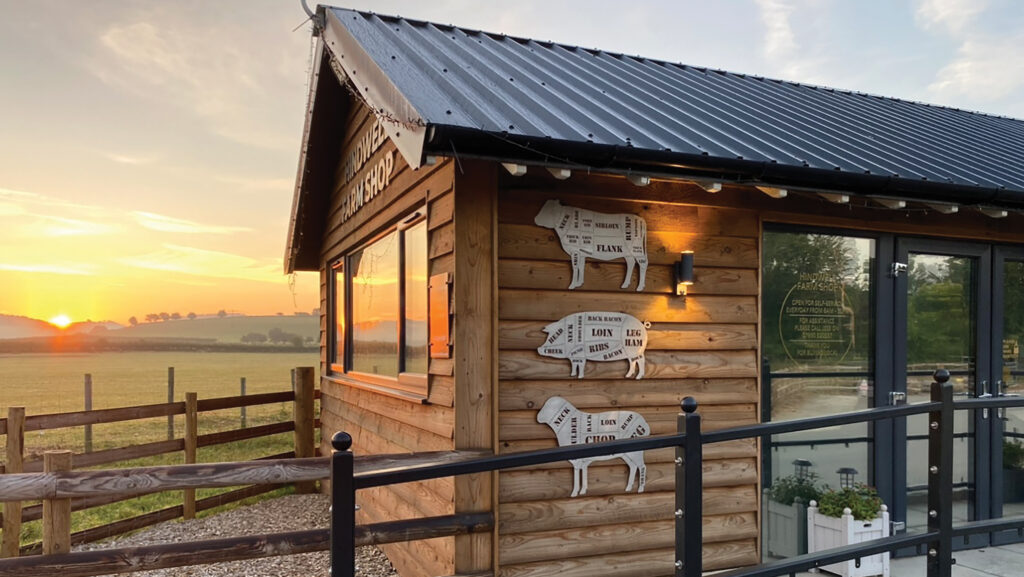
© Hindwell Farm
Jess and John Goodwin farm in partnership in the Radnor Valley, Mid Wales.
Theirs is a mixed beef, sheep, pig and arable holding, with breeding stock sales from 700 Easycare cross Exlana cross Aberfield ewes and 70 head of Aberdeen Angus cows forming an important element of the farm’s output.
They also offer holiday lets in a farmhouse sleeping up to 10. Their son George, 18, is studying agriculture at Reaseheath College and plans to come back to the farm.
Before installing the vending machines, Jess had been selling meat from the farm for several years on a small scale.
When Covid hit she was inundated with orders for boxes of meat from existing and new customers. “We simply couldn’t keep up with demand,” she says.
“I was leaving boxes at the end of the drive in a cooler box for people to come by for a scheduled isolated pick up.
“I was also travelling to the abattoir continuously as a key worker, to fulfil this demand.
“It was overwhelming and prompted us to look at different ways of selling to the public without being ‘present’, since this was becoming the new normal.”
While spending more time dealing with customers and orders, and less time farming, Jess came across Farm Pantry Vending, a relatively new company selling vending machines.
“With Covid looking to be around for some time, we jumped in pretty much blind and bought two machines,” she says.
How to house these was the next decision, with shipping containers considered initially.
However, they settled on a purpose-built wooden frame building, to keep the machines dry and away from the weather.
The machines plus the cost of the build represent an investment of about £85,000, which Jess describes as “a massive punt during Covid”.
“But we felt compelled to find a new way of selling our produce without the burden of having to man a shop.”
A Covid Bounce Back loan helped with some of the investment, and the vending operation opened in September 2021.
It took eight months to build and demanded close work with a surveyor and the local authorities, in particular the building regulations for a premises designed for public use.
This meant a lot of attention to detail to conform with disabled access and fire regulation policies.
Chilled, frozen and ambient offering
“The flexibility of having machines that can be frozen, chilled or ambient has been a huge factor in enabling us to keep the shop stocked throughout the year,” says Jess.
Bespoke cuts can also be offered. “Customers can also arrange to collect their goods from the shop via a private box and PIN number.
“This means we can carry on farming without having to wait around for customer collections.”
A 20kW solar array, installed before the shop venture, subsidises some of the power for running the machines and secondary freezer storage.
“The machines are very efficient and running costs would be around £150-£180 a month at today’s electricity prices,” says Jess.
“When we opened the shop, electricity prices were considerably cheaper so it’s wise to factor in ways of subsidising this unavoidable cost.”
Transaction fees, although small, must also feature in product pricing budgets. “We sell quality meat deserving of a premium price.
“However, we are quite realistic about the area we live in and recognise the need to be affordable,” she says.
Convenience shopping
Most customers buy an average of three products from the machines per visit, once or twice a week.
“It’s mostly convenience shopping, hence products like sausages, bacon, burgers and mince sell extremely well.”
Customers are generally aged 25-50. However, older generations increasingly want to buy local meat, says Jess.
“They may have at first been put off by the modern technology but after visiting realise that the process of buying is quite simple using a contactless card.”
There was plenty of help from the supplier before, during and after installation of the machines.
Jess says technical issues and problems have been few and far between, and dealt with quickly and positively.
“It was a big learning curve but the technology is simple and reliable. Our only issue on occasion can be the Nayax payment signal but this is very occasional.
“I spent a huge amount of time researching the machines, the layout of the shop, the logistics of the operation from farm to abattoir and from butcher back to the farm, not to mention breaking down the input costs such as electricity, insurance, packaging costs and my time.”
Margins were initially good, says Jess, but costs have risen in all areas over the three years since installation, mostly in killing, cutting, packaging, insurance and electricity, alongside increasing stock production costs such as feed and fertiliser.
Tight margins
“Margins are tight, but thankfully turnover of stock is high and key to servicing the debt.
“We have had to increase our prices to ensure we still make a profit, in particular as the market value of stock has also increased over the three-year period.
“It is a huge amount of work but wholly rewarding to see customers enjoying and appreciating the work that goes into producing quality local food.”
Free-range eggs, home-grown potatoes, seasonal fruit and local honey are available for cash sales in the shop too, giving valuable support to the meat machines operation.
Sales are driven through Facebook and Instagram, but word of mouth has also played a big part.
Jess says she would not change anything about the set-up of the machines.
“They are manageable for a one-person enterprise.
“However, it is becoming increasingly apparent that the costs associated with being ‘small scale’ may be a big factor in the long-term viability of the business.”
Case study: New Sheepfold Farm, North Yorkshire
Farm facts: New Sheepfold Farm
- Cash or card payments
- Open 8am-8pm
- Customers can choose products online, or download an order form and send to mobile. Orders by email also accepted
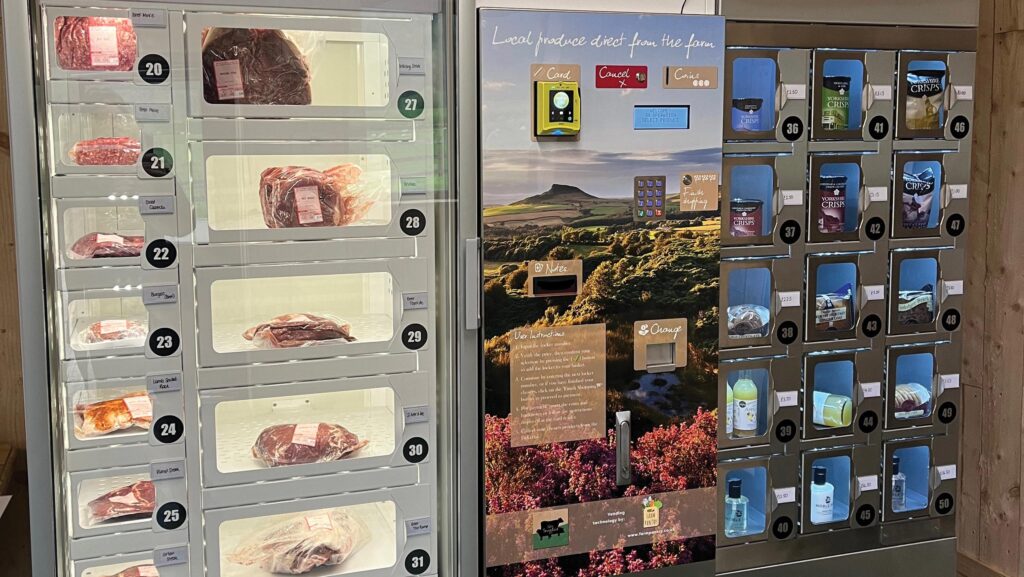
© New Sheepfold Farm
Running farm produce vending machines is not the “hands off” operation that people might think it is, says Louise Day, of New Sheepfold Farm, Ingleby Greenhow, on the edge of the North York Moors National Park.
Louise and her husband Mark have pedigree Beef Shorthorn cattle and 300 ewes, including 100 head of Exlana, along with some Herdwick and Soay sheep, on 97ha.
They retail frozen grass-fed beef and lamb from the farm, which also has four shepherd huts for rent and hosts many school visits, supported with Countryside Stewardship educational access payments.
Louise describes most of her regular customers as being in the older age group.
Being situated in the North York Moors National Park means the vending lockers also attract good passing trade from walkers and holidaymakers.
The machines at New Sheepfold take both card and cash.
Apart from knowing which machine to choose and how may lockers to install, Louise says it can be a difficult at first to stock them with the right items.
“We opened in December and put a few burgers in but these sold out in days, which we were not expecting.
“Also, when selling joints, it can be difficult to know what is the right size, but we also offer bespoke cuts to order.”
Extra bulk freezers had to be bought to keep the 12 freezer lockers stocked, while goods such as crisps and Botham’s of Whitby cakes and biscuits are offered in 15 ambient lockers.
Louise undertook the website design herself and keeps it updated, which is quite time consuming.
The housing and machines together cost about £30,000 and a 40% grant was contributed from the National Park, through the Farming In Protected Landscapes scheme.
“Realistically, we’re looking at 18 months to recoup our investment,” says Louise. Planning permission was not an issue because of the small size of the operation.
“The park authority has been fantastic in supporting us, and we have a fantastic environmental health department at North Yorkshire County Council.”
Louise describes Facebook as an amazing marketing tool. Leaflets and postcards have been delivered locally and word of mouth has been very important.
“It’s important to offer what you do well,” she says. “Tell your story. People want to understand where the produce comes from.
“They will ask about slaughter techniques, how far it has travelled… they will want to know the whole story.”
What would she do differently if starting again? “I would definitely do it again but it would go more slowly,” says Louise.
“We were pushed on timing because we were up against a grant application deadline, so we didn’t know about ancillary items that we could have included, such as temperature probes.”
She advises others to think carefully about insurance, having alarms linked to the freezer units in case of power cuts, and security cameras.
“Budget for your own time, in handling stock to and from the butcher, as well as the labelling,” says Louise, who would like to add more freezer lockers.
